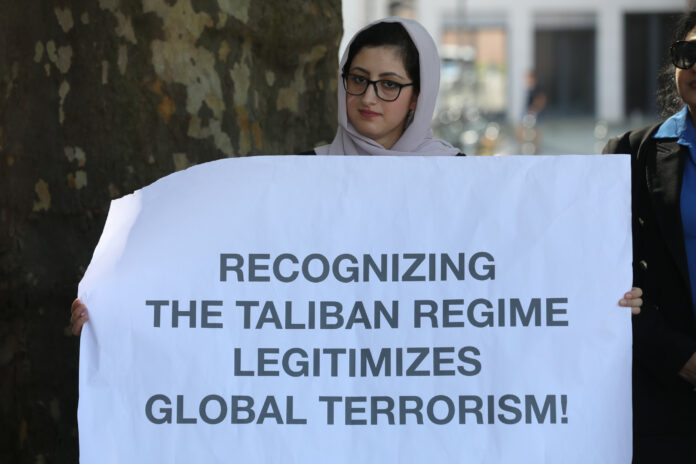Two years on from the Western withdrawal and the Taliban retaking of power in Afghanistan, it’s time to assess how Western policies have developed, the impact of those policies and what a new approach might look like. One conclusion is clear, however: those who believe positive engagement with the Taliban is the way forward risk abandoning the people of Afghanistan completely.
Since the return of Taliban, the West has employed a “carrot and stick” strategy, centered around “engagement.” The carrot is humanitarian aid, while the stick is increased diplomatic pressure and sanctions.
Aid, in various forms, has held Afghanistan together. Reliable statistics show that during 2022 about $3.7 billion was delivered by Western donor countries to Afghanistan, one-third of which was provided by the United States. That’s almost half of what the former Western-backed government received annually.
Yet instead of bringing about a more moderate Taliban—often referred as “Taliban 2.0″—this approach has achieved the opposite. It has bolstered the Taliban’s efforts in consolidating power, leading to continued oppression.
Aref Karimi/Getty Images
In assessing the impact of the West’s strategy towards the Taliban, it’s worth reminding ourselves of the three key objectives of the Doha Accord, signed between the U.S. and the Taliban in 2020.
First, ensure a baseline of human rights, including women’s rights. A recent United Nations report has unveiled disturbingcases of the arbitrary killing of former government and security personnel, an uptick in public executions and flogging those who commit “moral crimes.”
Women have been erased from political roles and most jobs in the public sector. They have no right to education above sixth grade and have no right to peaceful protest. To ensure they cannot organize, women are banned from public parks, gyms, and other public places. This wholesale gender discrimination is tantamount to a crime against humanity and gender apartheid.
Second, the Taliban was to cut ties with global and regional terror groups and to counter narcotics. The recent UN Sanction Team’s report states the Taliban provides support and maintains “strong and symbiotic” links with both global and regional terror groups. Seeking to increase their chances of diplomatic recognition, the Taliban has tried to curb opium cultivation, but the multibillion-dollar trade remains a significant source of income. The Taliban has not banned the trade of stored opium and experts say that there is a “significant inventory in the system.” There are also reports of a rise in meth production, which is even more profitable than heroin.
The final Doha objective was to establish an inclusive (though not necessarily democratic) political system, acknowledging the diverse nature of the country’s inhabitants. The track record of the Taliban in creating an inclusive political system is dismal. The Taliban misuse Islam and Pashtun identity to ignore the country’s fundamental pluralism and according to a UN report, has created a “highly exclusionary, Pashtun-centered and repressive” society, increasingly ruled by their reclusive supreme leader in Kandahar, who speaks as the ultimate religious authority and denies the existence of religious and ethnic diversity in Afghanistan.
The country is facing a dire humanitarian crisis. As emphasized by UN Secretary General António Guterres, 97 percent of the people in Afghanistan live in poverty, while a two-thirds of the population—28 million people—are in desperate need of humanitarian assistance this year. Meanwhile, more evidence is emerging that the Taliban are misappropriating humanitarian aid for their own purposes.
Well-intentioned Western voices call on their governments to keep talking with the Taliban. Sadly, there is little evidence that further engagement is likely to be productive. Using formal recognition of the Taliban as Afghanistan’s legitimate government as leverage is misplaced and dangerous.
The West instead needs to empower the democratic forces of Afghanistan: the women protesting against the Taliban, the marginalized voices in the media, NGOs, think thanks, academia, artists, musicians, entrepreneurs, sporting communities—myriad groups who share values of equality, liberty, justice and democracy.
Some of them have since escaped either to nearby countries or the West, but those remaining in the country are under increasing pressure. The right engagement strategy must also include the myriad armed resistance groups that fight against the Taliban. This is the best option available for the West, helping to construct a viable alternative to the Taliban.
The West can facilitate a dialogue with political figures who staunchly stand against the Taliban. Already, such a dialogue has started with the National Resistance Front, the largest resistance force against the Taliban, and the National Resistance Council for the Salvation of Afghanistan, established by former politicians based in Turkey, along with top diplomats, former government officials, journalists, and former parliamentarians.
The West can also convene a dialogue of the ulema, who are religious scholars fiercely opposed to the Taliban’s abuse of Islam.
As part of its sanction regime, the U.S. currently holds about $7 billion of funds belonging to the Afghanistan Bank, now run by the Taliban. By allocating a small percentage of these funds, the West can empower civil society and facilitate these dialogues.
Finally, these dialogues should build toward a national dialogue, supported by the international community, as well as a regional dialogue on a real alternative to the Taliban that the people of Afghanistan can support. These democratic forces need empowerment and support from the West to be able to undertake such an effort.
None of these steps will achieve immediate progress, and more years of difficulty probably lie ahead. The people of Afghanistan, inside and outside the country, need to provide an alternative. The West needs to serve them better by supporting these alternatives, because hoping the Taliban can be made better is a path to failure.
Zalmai Nishat is program lead for Central and South Asia at the Tony Blair Institute.
Daniel Sleat is senior policy advisor, Europe and Global Trends at the Tony Blair Institute.
The views expressed in this article are the writers’ own.


